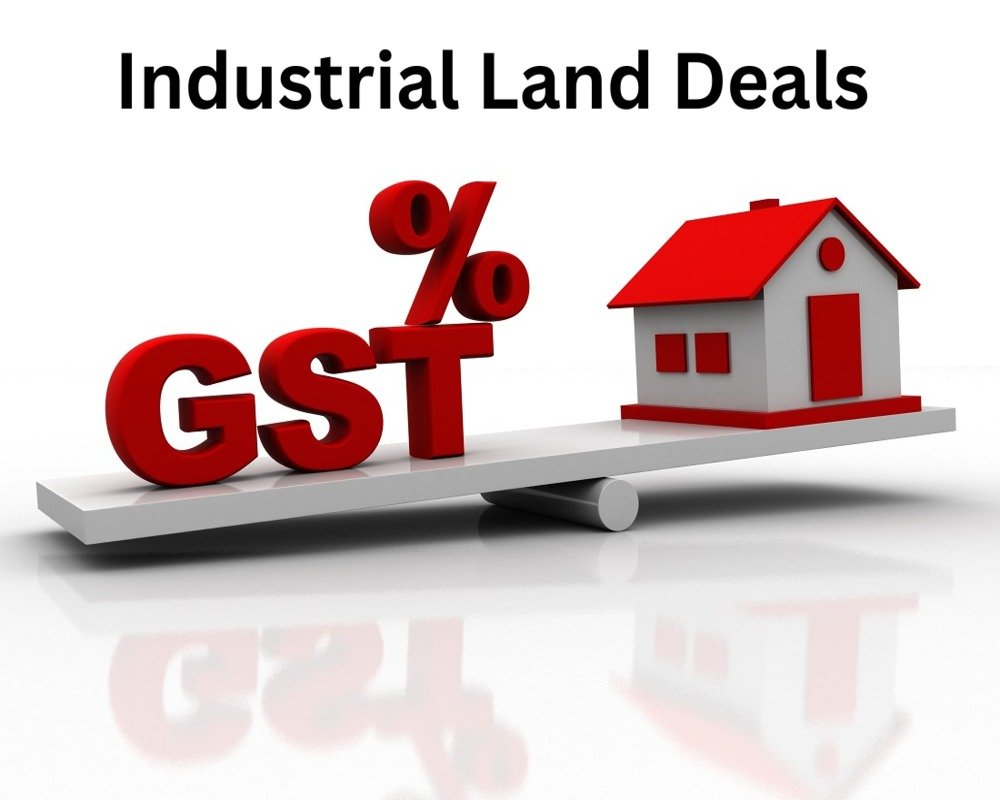1. No GST on Pure Sale of Industrial Land
As per GST law, the sale of land alone is not treated as a supply of goods or services, and hence is fully exempt from GST.
- Applies to raw, vacant, or NA (Non-Agricultural) land
- No GST on sale consideration
- Only stamp duty and registration charges apply
- Applies to direct land transfers (not development agreements)
2. GST Applies If There’s Construction on the Land
If you sell land with a built-up structure (e.g., factory, warehouse, shed), GST may apply on the construction portion only.
- 18% GST on construction value (not land value)
- Split of land vs. building must be clearly documented
- Buyers should demand GST invoice if building is included
- Input Tax Credit (ITC) may be claimed by buyer (if registered)
3. Lease of Industrial Land May Attract GST
Long-term lease (more than 30 years) of industrial land can be treated as sale of immovable property and is exempt. But short-term leases or rentals may attract GST.
- Leasing from private owner: 18% GST on rent
- Leasing from government: 18% GST (with RCM applicability)
- No GST on lease for agricultural use
- GST applies only to commercial/industrial lease income
4. GST on Land Development Services
If the seller provides land development services (like roads, drainage, compound wall, etc.), GST is applicable only on the service component.
- GST @ 18% on infrastructure service fees
- No GST on actual land area sold
- Service invoice should be raised separately
- Applies in plotted layouts and industrial park sales
5. Government Authority Land Allotments
When land is allotted by bodies like SIPCOT, MIDC, GIDC, APIIC, GST is applicable only if lease or development services are bundled.
- Long-term lease by government: GST @ 18% (RCM)
- GST exemption available for core land component
- Usually embedded in composite price from authorities
- Government sellers must issue tax invoice
6. GST Registration Required for Land Developers
If you’re selling developed industrial plots with infrastructure or bundled services, and turnover exceeds ₹20 lakh (or ₹10 lakh in special states), you must register under GST.
- Developers offering layout + infra = taxable under GST
- Composite supply principles apply
- Buyers may claim ITC if using land for registered business
- Must maintain separate invoicing for land vs. service
7. GST Applicability in Joint Development Agreements (JDAs)
In JDAs, where landowners and developers share profit or constructed units, GST is applicable on the construction services, not the land transfer.
- Developer pays GST on built-up area transferred to landowner
- Valuation based on construction cost
- No GST on land portion in owner’s share
- Complex compliance under RERA + GST + Income Tax
8. Buyers Can Claim Input Tax Credit (ITC) in Certain Cases
If the buyer is a GST-registered business, and the land includes taxable infrastructure or lease component, ITC on GST paid can be claimed.
- Useful for warehousing, factories, logistics players
- Must match invoice with GST filings
- No ITC on stamp duty or land value
- Proper GST breakup needed in agreement
9. Stamp Duty & GST Are Separate Liabilities
Even if GST is not applicable on land, stamp duty and registration fees must still be paid as per state laws. These are not creditable under GST.
- Stamp duty: 5%–7% (varies by state)
- Registration: ~1% of sale value
- GST (if applicable) is over and above these costs
- Must factor both while calculating total transaction cost




